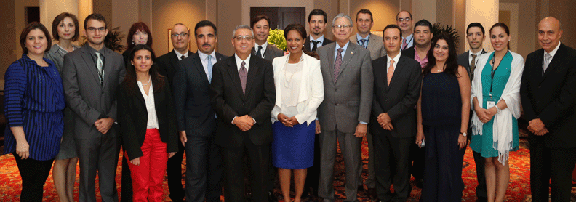
Panama delegation visits the Atlanta Fed.
Sixth District cash operations
The Miami Branch of the Atlanta Fed serves as one of two primary Fed offices that help satisfy global demand for U.S. banknotes and coins, making payments to and accepting deposits from financial institutions that have included several central banks throughout Latin America and the Caribbean. In 2015, the Miami Branch provided cash services to 30 countries in the region, including the dollarized nations of Panama, Ecuador, and El Salvador. International cash services comprise half of the Miami Branch's total activity.
In 2015, Miami's International Cash Unit conducted extensive outreach with partners throughout Central America and the Caribbean. For example, members of the International Cash Unit met with representatives from De Nederlandsche Bank to review deposit quality guidelines and exchange information on U.S. currency and coin demand in the Dutch Caribbean islands of Bonaire, St. Eustatius, and Saba (BES islands). They also met with representatives of the Banco Nacional de Panama and Banco Central de Reserva de El Salvador to discuss and clarify operational matters pertaining to currency deposit guidelines.
Dissertation internship program
Each year, the Americas Center invites doctoral candidates who are writing dissertations in economics that are related to Latin America and the Caribbean to apply for a summer dissertation internship. The students make presentations on their research and are expected to make significant progress on their dissertation during their stay. In 2015, Antonio Cusato of Rutgers University was selected. His dissertation title is "Essays on the Political Economy of Sovereign Default."
District Cash staff participated in a System-wide review of international cash compliance processes to assess and enhance due diligence monitoring of Federal Reserve international cash transactions, and also implemented operational changes that reflect the Fed's wholesale role in international cash distribution.
Leadership in supporting international payments
The Retail Payments Office (RPO) continued its role in providing international payment services in the Americas and other global jurisdictions. The Federal Reserve's FedGlobal ACH services currently reach 25 countries including three in the Americas. In 2015, the RPO participated in a number of outreach efforts in partnership with various Latin American entities.
RPO staff participated in a Dallas Fed roundtable for credit unions on banking underbanked Hispanic communities, focusing on the vital role of Directo a Mexico. RPO team members also met with colleagues from the Japanese Banking Association, NTT Data, and the Central Bank of Japan to discuss the visibility of connections between the United States, Japan, and other ASEAN countries. The team met with Governor Agustin Carstens and other officials from Mexico's central bank when they visited the Atlanta Fed. Senior Atlanta Fed leadership attended the SWIFT SIBOS conference in Singapore, joining other Reserve Bank representatives from New York, Boston, and Chicago as well as global industry players to discuss the latest payments trends around the world.
The RPO continued to support the International Payments Framework Association (IPFA) and hosted an IPFA Instant Payments Workgroup meeting, which included representatives from Japan, Brazil, and Europe. Nell Campbell-Drake was appointed to the IPFA's board of directors and now serves as the association's treasurer.
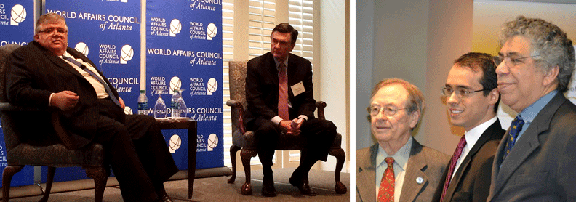
(left picture) Governor Agustin Carstens of the Bank of Mexico with Atlanta Fed President Dennis Lockhart
(right picture) Brazil Economic Forecast Meeting
Developing effective national and regional consolidated supervision best practices
In 2015, the Atlanta Fed's International Supervision/Country Risk & Foreign Banking Organization (FBO) Analysis staff attended three risk-focused supervisory colleges for global and regional foreign banking organizations from Spain and Latin America with a significant presence in the Sixth District. Atlanta Supervision and Regulation staff's participation at these types of forums fosters important dialogue and working relationships with home country supervisors and other foreign regulatory counterparts from across the region. It also supports International Supervision's core responsibilities under the Foreign Bank Supervision Program and evolving Dodd-Frank Act implementation in the United States. Additionally, these colleges provided an opportunity to exchange current information on key home country and regulatory environment challenges, emerging risks, and trends that relate to the foreign banks' U.S. operations.
Atlanta Fed Supervision & Regulation representatives also attended the third annual Crisis Management Group (CMG) meeting at the Bank of Spain. Representatives from the Bank of Spain, the European Central Bank, the European Banking Authority, the Single Resolution Board, Spain's Fund for Orderly Bank Restructuring (FROB), the Federal Deposit Insurance Corporation (FDIC), and three Mexican regulatory agencies attended the meeting. The CMG's general purpose is to ensure an orderly resolution of failing banks with the ability to act swiftly and in an appropriate and proportionate manner in order to avoid future bailouts, placing the burden of resolution on the banks with minimum costs to taxpayers and the real economy.
International Supervision staff also hosted a meeting at the Miami Branch with the visiting examination team from the Banking Superintendency of Peru. These ongoing opportunities to meet with supervisory counterparts continue to support the Americas Center's mission to build solid working relationships across the region and get a more in-depth understanding of home country supervisory programs and the home country's regulator's perspectives on the firm's domestic and global operations.
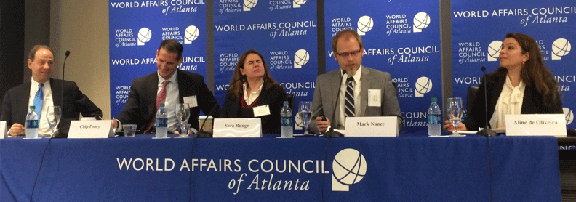
Anti-Money-Laundering Roundtable
The Atlanta Fed once again supported the Federal Reserve System's foreign technical assistance initiatives in 2015. Atlanta Fed Supervision staff, representing diverse areas of technical expertise, served as instructors at programs hosted by foreign regulatory agencies and multilateral organizations held in Peru, the British Virgin Islands, India, and Brazil.
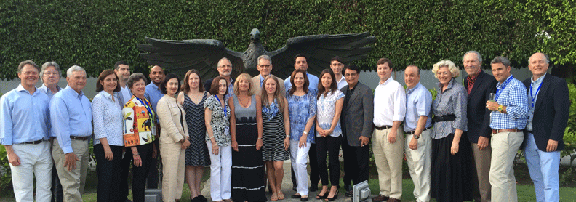
World Affairs Council trip to Cuba
In November, International Supervision staff cohosted an Americas Center breakfast program with the Florida International Bankers Association (FIBA) on "Cybersecurity Risks & Economic Outlook for the U.S., South Florida, & Latam." Participants discussed current supervisory perspectives on emerging cybersecurity and IT risks, a hot topic that was widely requested by FIBA's membership. The meeting featured an interagency panel with experts from the Atlanta Fed, Office of the Comptroller of the Currency (OCC), and FDIC. The meeting concluded with an economic update on the United States and South Florida, and a discussion of the major economies of Latin America.
Building a better understanding of the economy
The Americas Center hosted three workshops devoted to new research on a range of economic topics. In February, the Americas Center and the Inter-American Development Bank cohosted "Non-Contributory Pensions, Social Assistance Programs, and Household Savings in Latin America and the Caribbean." Economists presented new research on non-contributory pensions in Argentina, Bolivia, Brazil, and Mexico. The keynote speaker was the Atlanta Fed's Toni Braun, a research economist who discussed new research on support for means tested benefits.
In the Workshop on International Economics, which is cosponsored with New York University's Stern School of Business and held in December, economists presented new research on monetary policy, sovereign debt, and firms in the open economy. The meeting was held at New York University and highlights included "Distributional Incentives in an Equilibrium Model of Domestic Sovereign Default," presented by Enrique Mendoza of the University of Pennsylvania, and "Financial Frictions and Export Dynamics in Large Devaluations," presented by Fernando Leibovici of York University.
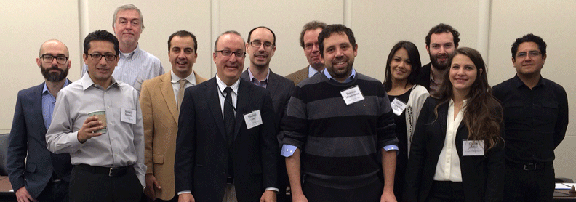
Workshop on Household Savings in Latin America
At the Southeastern International Development Economics workshop in December, cosponsored with the economics departments of the University of Georgia, Georgia Tech, Georgia State University, and Mercer University, economists from throughout the Southeast discussed new research on economic development. Joseph Bankoff, the chair of the Sam Nunn School of International Affairs at Georgia Tech, presented the keynote luncheon speech on innovation and the Chinese economy.
The Americas Center also hosted two events focused on specific policy challenges. In January, the center, the Brazil-American Chamber of Commerce, and the World Affairs Council of Atlanta cohosted a roundtable session on the outlook for Brazil's economy. The featured speakers were Otaviano Canuto from the World Bank and Vinicius Botelho of the Getúlio Vargas Foundation in Rio de Janeiro. In December, the Americas Center, the World Affairs Council of Atlanta, and the Center for International Strategy, Technology, and Policy at Georgia Tech cosponsored "Does Money Laundering Impact Your Business?" The roundtable discussion featured experts from the Treasury Department, the private sector, and academia. Featured speakers included Sarah Runge, the director of Treasury's Office of Strategic Policy for Terrorist Financing and Financial Crimes; Chip Poncy, president and cofounder of the Financial Integrity Network; John Atkinson, a director at Protiviti; and Mark Nance, an assistant professor at North Carolina State University.
Throughout the year, Atlanta Fed economists developed new research on a range of topics related to the Americas, including immigration, remittances, and pensions. Stephen Kay coauthored two articles with Milko Matijascic on pension reform and social policy in Brazil that were published in the International Social Security Review. Federico Mandelman presented "Labor Market Polarization and International Macroeconomic Dynamics" at the ITAM-University of Pennsylvania Macro Meetings in Mexico City and "Offshoring, Low-Skilled Immigration, and Labor Market Polarization" at the NBER Summer Institute in Boston.


